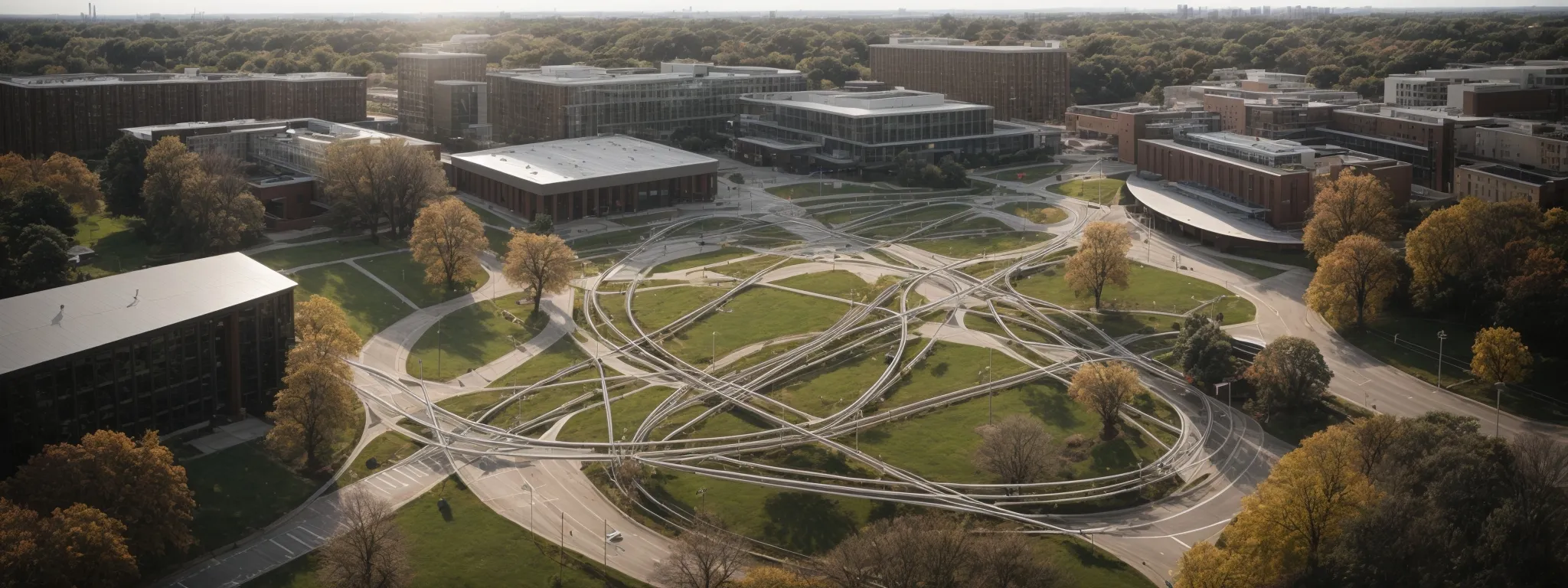SEO Guide for College Websites – Part One
Essential SEO Strategies for Enhancing College Websites – Part One Navigating the intricate landscape of search engine optimization (SEO) can be a formidable challenge for higher education […]
Essential SEO Strategies for Enhancing College Websites – Part One
Navigating the intricate landscape of search engine optimization (SEO) can be a formidable challenge for higher education institutes keen on attracting a new cadre of bright minds.
For colleges and universities, a robust SEO strategy is not merely about driving site visitors; it’s a nuanced endeavor to connect with potential students, showcase academic programs, and highlight the unique characteristics of the institution.
From the precise tailoring of keyword research to resonate with a scholarly audience, to the crafting of razor-sharp content that captivates the reader and satisfies search engine crawlers, every detail matters on this road to digital prominence.
Keep reading to unlock the full potential of your college’s web presence with proven SEO methodologies.
Key Takeaways
- SEO Is Vital for Higher Education Institutes to Enhance Online Visibility and Attract Potential Students
- Strategic Keyword Research and Targeting Are Central to Aligning Academic Programs With Student Search Habits
- On-Page SEO, Including Optimized Titles and Meta Descriptions, Is Key for Improving Web Pages’ Search Rankings and User Engagement
- Internal Linking Within a College’s Website Supports Navigation and Thematic Coherence, Positively Impacting Search Rankings
- Continuous Tracking and Analysis of SEO Efforts Are Crucial for Colleges to Refine Strategies and Increase Enrollment Conversions
Understanding the Basics of SEO for College Websites

The digital age has ushered in a new frontier for higher education institutes, where visibility on the internet can markedly impact a college’s ability to attract students and faculty.
Search Engine Optimization, or SEO, emerges as a critical tool in this endeavor, significantly influencing a college’s online presence and accessibility.
When colleges understand and harness the power of SEO, they align their digital content with the needs and behaviors of prospective students, positioning their programs and offerings efficiently within search engine results.
For those responsible for managing a college website, mastering SEO entails a dual commitment: defining SEO and appreciating its profound impact on institutions, and concurrently, identifying and articulating precise SEO goals tailored to the institution’s unique aspirations and benchmarks.
Defining SEO and Its Significance for Colleges
Search Engine Optimization for higher education institutes involves a meticulous blend of technical acumen and creative strategy, with the goal of elevating a college’s online visibility when critical search terms are entered by potential students. This digital tailoring ensures a college’s website resonates with the search engine’s complex algorithms, fostering an online environment where information about graduate business degrees, campus life, and academic programs reaches the target audience efficiently.
SEO’s significance for colleges cannot be overstated, as it directly influences the volume and quality of traffic to their website. Effective optimization, such as on-page SEO services and white-label link building provided by LinkGraph’s SEO services, transforms the institution’s online presence, making it more navigable for both prospective students and search engine crawlers, thus improving search engine rank and user experience simultaneously.
Identifying Your College Website’s SEO Goals
To chart a course for effective search engine optimization, a college must first set clear, strategic objectives: What does success look like in terms of online search presence? Identifying goals might involve improving the ranking of specific program pages, increasing the visibility for local searches, or amplifying overall brand awareness via search engines.
- Elevating the search engine rank of a graduate business degree program page.
- Boosting local SEO presence to attract nearby students.
- Expanding brand reach in search results to enhance institution reputation.
Once goals are laid out, LinkGraph’s SEO services can tailor a strategy that hinges on these targets. By utilizing SearchAtlas SEO software and engaging with white label SEO services, colleges can create a user-focused website experience that aligns with the institution’s predefined SEO ambitions.
Researching Keywords Tailored to Higher Education

Navigating the expansive terrain of search engine ranking is a paramount challenge for higher education websites, wherein the intricate process of keyword research becomes the compass to guide their SEO strategy.
By meticulously selecting appropriate keywords for academic programs and analyzing prevailing search trends relevant to college-related queries, these institutions lay down the foundational elements of a robust SEO campaign.
It is crucial that the keyword selection resonates with the queries of a targeted audience, ensuring that programs and degrees, such as a business degree, align seamlessly with the search habits of prospective students.
LinkGraph’s SEO services stand prepared to equip educational institutions with the tools necessary to undertake such sophisticated keyword research, ultimately polishing their digital entryway into the halls of higher learning.
Selecting the Right Keywords for Academic Programs
In the realm of higher education SEO, identifying the most potent keywords for academic program pages is a critical undertaking that can set a college apart in a crowded digital marketplace. LinkGraph’s advanced SEO services empower educational organizations to dissect granular search patterns, honing in on target keywords that resonate with the academic aspirations and search behaviors of potential students.
Employing a strategic blend of SEO techniques, LinkGraph’s SearchAtlas SEO software meticulously aligns web content with the intent behind search queries, ensuring program pages like those of a graduate business degree are not only found but also appeal to the searcher’s quest for educational advancement. This precise keyword-targeting approach paves the way for enhanced visibility in search engine result pages, bolstering a college’s online authority and appeal.
Analyzing Search Trends for College-Related Queries
Delving into the intricacies of search trends for college-related queries is a nuanced process that demands an in-depth understanding of prospective students’ online behaviors. Through this analysis, SEO experts can unveil patterns that inform an educational institution’s keyword strategy, ensuring seamless alignment between their offerings, like a business degree, and the digital paths students follow to their website.
In the competitive educational landscape, the team at LinkGraph executes a meticulous examination of search query trends, equipping colleges with invaluable insights. This empowers the web team to optimize their content, not merely for search engine algorithms but to resonate authentically with the aspirations and curiosities that drive potential students to explore higher education options online.
Crafting Compelling Content for Prospective Students

Crafting engaging, informative content stands as a cornerstone of a successful SEO strategy for higher education websites, where the objective extends beyond mere ranking to captivating the minds of potential students and guiding them along educational and professional trajectories.
Institutions like colleges and universities strive to produce web content that not only resonates with the ambitious paths of tomorrow’s leaders but also adheres to the stringent requirements of search engines, ensuring heightened visibility and an authoritative online presence.
In this section, readers will glean insights into how higher education entities can synchronize their content efforts with student interests and the sophisticated mechanisms of search engine algorithms, fostering a digital ecosystem conducive to academic discovery and institutional prominence.
Aligning Content With Student Interests and Career Paths
Forging a connection between a college’s online material and the aspirations of its audience is paramount in curating an SEO-optimized website. Institutions advance their SEO efforts by intertwining their content with the career objectives and academic interests of potential students.
| Student Interests | Content Focus |
|---|---|
| Entrepreneurship | Spotlight on Innovation Programs and Startup Incubators |
| Technology | Features on Cutting-Edge Labs and IT Degree Pathways |
| Public Service | Insights into Community Engagement and Service Learning |
This symbiotic relationship between the user’s search intent and the institution’s web content ensures that prospective students find relevant, engaging information that propels them along their educational journey: a fusion of SEO best practices with user-centric storytelling.
Ensuring Your Content Strategy Appeals to Search Engines
Adeptly and strategically crafting content caters to the dual audience of site visitors and search engine crawlers alike. LinkGraph’s on-page SEO services are expertly designed to optimize each web page, assuring seamless integration of target keywords within compelling, informative text that underpins both search engine protocols and user interests.
Adherence to SEO factors such as title tags, meaningful header hierarchies, and the sound architectural framework of URL structures amplifies the clarity and relevance of an institution’s web content. By fine-tuning these elements, LinkGraph ensures content not only captivates but also effectively communicates with search engines, enhancing search result positioning and establishing a staple presence in the digital marketplace of higher education.
Enhancing on-Page SEO for Academic Web Pages

Illuminating the digital path to higher education, on-page SEO is a vital component in crafting an online presence that not only ranks well but also entices and retains the interest of potential students.
Within this specialized field, elements such as optimizing titles and headers for degree courses become powerful beacons guiding users through the vast array of academic offerings.
Concurrently, crafting compelling meta descriptions serves as a decisive factor in improving click-through rates from search engine results, effectively funneling a more engaged audience onto college web pages.
These pivotal areas of optimization work in concert to forge a strong online foothold, paving the way for institutions to showcase their courses and programs to an eager academic community.
Optimizing Titles and Headers for Degree Courses
In the intricate landscape of a college’s digital platform, optimizing titles and headers for degree courses serves as a transformative SEO strategy. This practice ensures that each academic offering has a clearly defined digital signature, facilitating its discovery by students whose ambitions align with the institution’s specialized programs.
By embedding target keywords into the page title and headers, LinkGraph’s SEO services elevate the relevance of degree course web pages in search engine result pages. This meticulous attention to detail garners a competitive edge in search rankings, beckoning an audience precisely at the intersection of academic search and intent.
Using Meta Descriptions to Improve Click-Through Rates
Meta descriptions act as concise summaries underpinning a web page, providing prospective students with a snapshot of what they can expect upon clicking through. LinkGraph’s Expertise in creating compelling meta descriptions significantly bolsters the potential for higher click-through rates, which in turn can enhance the search visibility of academic program pages.
LinkGraph utilizes SEO best practices in crafting these meta narratives, ensuring they are not only appealing to the searcher’s curiosity but also laden with target keywords relevant to the academic content within. This strategic application serves as an inviting doorway, encouraging searchers to engage with a college’s website and thereby increasing the site’s search result efficacy.
Leveraging the Power of Internal Linking on College Sites

In the digital ecosystem of higher education, the architecture of a college’s website forms the backbone of a student’s online journey, guiding them through a myriad of informational pathways.
A well-implemented internal linking strategy stands as a pivotal element within this intricate web, serving not just to facilitate ease of navigation but also to weave a tapestry of academic relevance.
Instituting a logical structure for internal links enhances the navigation experience for site visitors, while the tactical interconnection of related academic content elevates a website’s thematic coherence, bolstering its stature in the eyes of both users and search engine crawlers.
Structuring Internal Links for Easy Navigation
Creating a user-friendly sitemap with intelligently structured internal links is a prime objective for colleges to ensure students can effortlessly navigate through their CMS site. This clear internal linking facilitates not only the user’s ability to find relevant information with a few clicks but also aids search engine crawlers in indexing the site’s pages effectively.
Colleges must prioritize logical and contextual linking within their content, directing site visitors toward additional valuable resources, such as detailed program pages or related blog posts. Such a strategy enhances user experience by providing pathways to expand their knowledge and interest in the institution’s offerings:
| Main Page | Internal Link | Purpose |
|---|---|---|
| Ambitious Paths | Graduate Business Degree Programs | To guide students toward specialized graduate programs |
| Innovation Hub | Startup Incubator Resources | To connect students with entrepreneurial opportunities |
| Community Engagement | Public Service Initiatives | To showcase the college’s community-driven projects and involvement |
Ultimately, well-structured internal links act as signposts, leading site visitors through a curated journey of the college’s web landscape, while reinforcing the relevance and authority of the site in search engine assessments.
Connecting Related Academic Content to Boost Relevance
In the competitive arena of higher education, carefully interlinking related academic content enhances a college’s website coherence, thereby boosting its thematic relevance and search ranking potential. This strategic approach often overseen by LinkGraph’s SEO services, systematically connects individual academic offerings, making it easier for search engines to discern a college’s specialty areas and showcase those programs prominently to interested students.
Implementing Internal Linkage that is context-aware not only enriches the student’s navigation experience but also fortifies the website’s SEO foundation. LinkGraph’s proficiency ensures that each hyperlink adds to the narrative of an institution’s academic programs, creating an intertwined web of educational content that reinforces the institutional brand as a leader in higher education.
Measuring SEO Progress With Analytics and Tools

As higher education institutes sharpen their focus on digital presence, measuring the efficacy of SEO strategies through analytical tools becomes indispensable.
The ability to track and analyze enrollment-related conversions equips colleges with the insights needed to evaluate whether their online efforts resonate with potential students.
By setting up robust tracking mechanisms and constantly analyzing performance data, these institutions can iteratively refine their strategies, ensuring that every tweak and adjustment to their web pages drives towards optimal engagement and conversion.
This ongoing process of measurement and analysis forms the backbone of a dynamic, data-driven approach to SEO for college websites.
Setting Up Tracking for Enrollment-Related Conversions
Colleges Meticulously Deploying Tracking Parameters for enrollment-related conversions unearth critical data streams amplifying the strength of their SEO campaigns. By integrating specialized analytics tools, LinkGraph enables institutions to monitor the precise movements and behaviors of prospective students, illuminating the pathways from initial interest to eventual application.
With the diligent application of LinkGraph’s SEO services, institutions gain access to rich, actionable insights, allowing them to measure the impact of their optimization efforts on student admissions. These insights serve as a navigational beacon, pinpointing the efficacy of each SEO maneuver in the grand scheme of attracting and enrolling new students.
Analyzing Performance Data to Refine Strategies
LinkGraph’s comprehensive approach to analyzing performance data allows institutions to pinpoint the most fruitful SEO strategies for their online platforms. Through a judicious review of engagement metrics, bounce rates, and conversion statistics, the effectiveness of deployed tactics becomes clear, guiding the refinement of initiatives to elevate the appeal and functionality of college websites.
Armed with the insights provided by data analysis, LinkGraph’s SEO services enable academic websites to iteratively adapt their approaches, ensuring that content and keyword strategies are aligned with the evolving interests and search behaviors of their target audience. This dynamic, data-informed methodology propels colleges toward optimal online performance and visibility.
Conclusion
In conclusion, adopting essential SEO strategies is vital for college websites to improve their digital presence and attract potential students.
By defining clear SEO goals, colleges can tailor their optimization efforts to enhance their programs’ online visibility.
This involves conducting thorough keyword research, crafting content that aligns with student interests, and optimizing on-page elements such as titles, headers, and meta descriptions to appeal to both search engines and users.
Additionally, a structured internal linking strategy improves site navigation and thematic coherence, further boosting search engine rankings.
Finally, the use of analytics tools allows colleges to measure the success of their SEO strategies and refine them for maximum effectiveness.
These combined efforts result in a stronger, more engaging online presence, ultimately driving enrollment and reinforcing the institution’s reputation in the digital marketplace.














































































